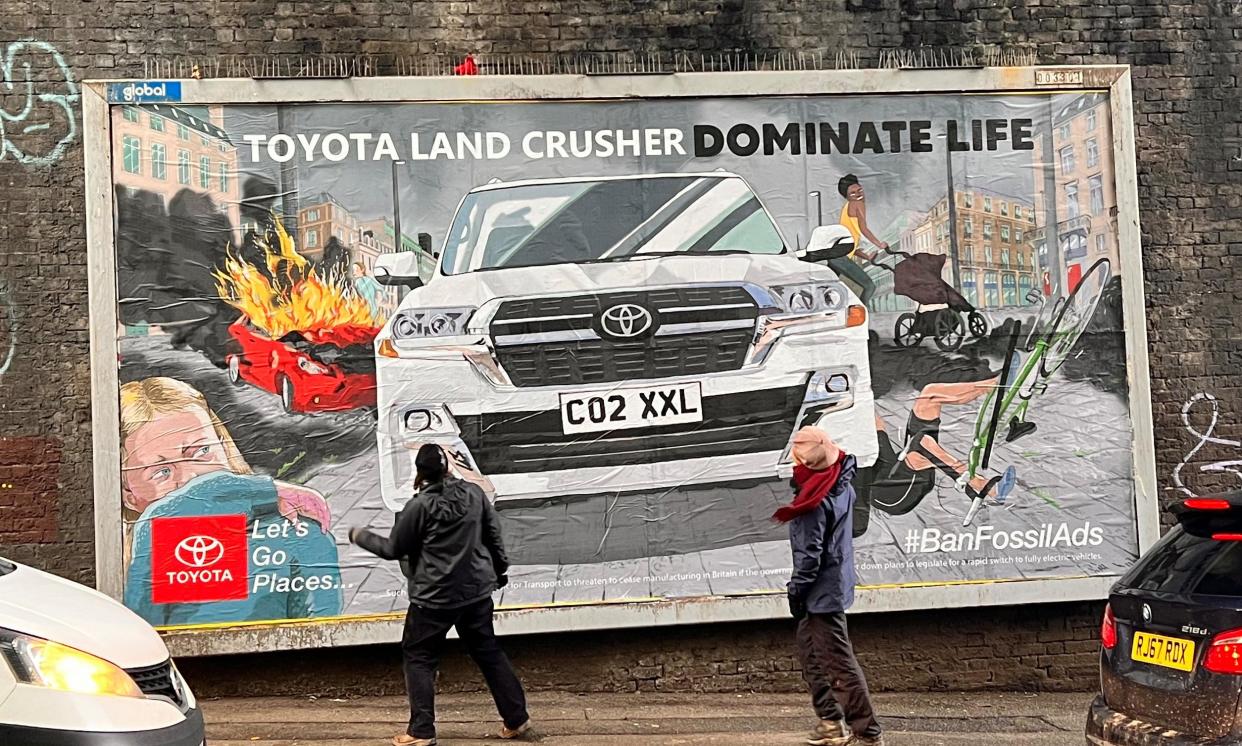Spoof billboard ads take aim at BMW and Toyota over ‘going green’ claims

Guerrilla “subvertisers” have taken aim at BMW and Toyota with a campaign of spoof adverts that they say reveals the truth behind the carmakers’ claims to be going green.
As the European Motor Show opened its doors in Brussels for its 100th anniversary over the weekend, climate activists hijacked more than 400 advertising billboards and bus stops in Belgium, France, Germany and England, calling out the companies.
Satirising the manufacturers’ advertising messages, the billboards highlighted what activists describe as the misleading adverts and aggressive lobbying tactics used by Toyota and BMW.
The posters were installed on advertising hoardings over the past few days in a series of guerrilla actions by activists from Subvertisers International, Brandalism and Extinction Rebellion.
Spoof BMW adverts ran on the London underground and on bus stops showing a family of crash-test dummies surrounded by fumes, with the message: “When we test our emissions, the test dummy – is you.”
A billboard in Brighton was taken over by a vision of a cartoon climate dystopia, including dead animals, toxic waste and burning forests, in the middle of which sat a Toyota 4x4. Above it rose the slogan: “Let’s ruin everything.”
In a strip across the bottom, small print referencing a study by the thinktank InfluenceMap read: “In November 2022 Toyota were ranked the 10th worst company in the world for their climate footprint and lobbying against climate action.”
In London, another poster pasted over a billboard contrasted a clean image of a Toyota 4x4 with the grimy reality of driving a congested city road. It said: “Toyota’s beyond zero means flogging gas guzzlers for years to come.”
Tona Merriman, a spokesperson for Brandalism, said: “Toyota have pushed their ‘Beyond Zero’ sustainability adverts whilst lobbying governments around the world to weaken air quality plans and threatening legal action to protect their profits over a livable climate. Their adverts are duplicitous.”
Responding to criticism, Toyota said it had been working to reduce its environmental impact for decades, in areas including greenhouse gases, air quality, water and materials reduction, reuse and recycling, and biodiversity. The company said it was committed to carbon neutrality across its global operations by 2050 and in Europe by 2034, and that its targets had been externally verified. It said it was “committed” to eliminating CO2 emissions from new vehicles sold in Europe by 2035.
In the meantime, a mix of electric and conventional combustion engine vehicles was the only pragmatic solution “to lower carbon emissions as much as possible and as soon as possible”, Toyota said.
“We believe carbon is the enemy, not any particular technology. Currently, not everyone has access to ZEVs [zero-emission vehicles] due to lack of infrastructure or other market barriers and we believe that giving people access to multiple technologies is a more inclusive path towards carbon neutrality.
“Which is why we offer battery electric vehicles and fuel-cell electric vehicles and plug-in hybrids and hybrids. We call this the ‘power of and’ because rarely does one size fit all when you consider the diversity of customer needs.
“This will enable us to significantly decarbonise society now, by making all electrified technologies available to meet customers’ needs everywhere.”
A BMW spokesperson said: “Sustainability is a central part of the BMW Group’s corporate strategy. The BMW Group is firmly committed to achieving climate neutrality by 2050 and we are adopting a scientifically validated and transparent path through the entire value chain.
“BMW was one of the first automotive brands to bring a mainstream electric vehicle to market in 2013 with the BMW i3 and by 2030, at least 50% of our global sales will be fully electric. In the short term, the company is taking steps today to reduce the total carbon footprint of our products by 40 per cent throughout their lifecycle by 2030 compared with 2019 levels. As the first German carmaker to join the “Business Ambition for 1.5°C” and a member of the UN’s Race to Zero programme, we believe in action and continued dialogue.”
Brandalism said the pan-European subvertising actions were a call for greater government regulation of “environmentally harmful products” to prevent polluters making “misleading green claims”.
“Toyota and BMW use slick marketing campaigns to promote oversized SUV models that clog up urban neighbourhoods,” Merriman added. “Electric SUVs are no solution – they’re too big for most parking spaces and their tall bumper size and excessive weight present an increased risk to pedestrians, especially children, involved in road collisions.”

 Yahoo News
Yahoo News 
